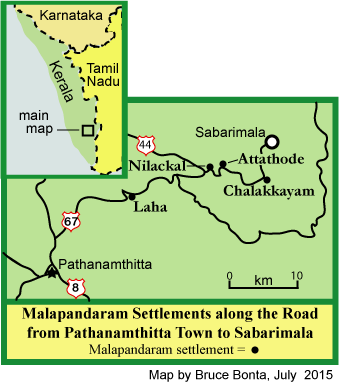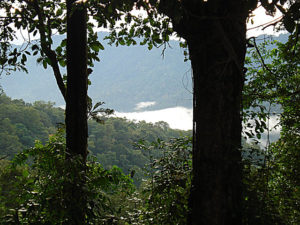Over the past several weeks, two news reports about the Malapandaram have appeared in a major Indian newspaper, which is notable since that peaceful society gets less news coverage than any of the other 24 covered by this website.
 A news report published on March 4 in The Hindu was the more informative of the two. It indicated that the District Collector of the Pathanamthitta District of Kerala, Mr. S. Harikishore, had alerted doctors to an outbreak of a virus that has affected the Malapandaram communities near Sabarimala. Mr. Harikishore was responsible in the summer of 2015 for finding a way to keep the tribal school at Attathode open despite financial problems, according to news coverage last year.
A news report published on March 4 in The Hindu was the more informative of the two. It indicated that the District Collector of the Pathanamthitta District of Kerala, Mr. S. Harikishore, had alerted doctors to an outbreak of a virus that has affected the Malapandaram communities near Sabarimala. Mr. Harikishore was responsible in the summer of 2015 for finding a way to keep the tribal school at Attathode open despite financial problems, according to news coverage last year.
As a result of his recent intervention, the Health Department has provided what the newspaper referred to as “free medical camps” for the inhabitants of Chalakkayam, Milackal, the tribal school at Attathode, and other Malapandaram communities in the Sabarimala region.
Gracy Ithaq, Medical Officer for the district, told the paper that the medical teams had set up makeshift sheds in the Malapandaram communities in order to treat the victims of the fevers. Health officials were alerted to the problem by news reports a few days before. A doctor named Sini treated 12 children who were suffering from the fever and two others who had diarrhea. At the government Tribal School at Attathode, the doctor found one more child with a fever and another with tonsillitis. All were treated with appropriate medications.

The paper went on to describe, in a condemnatory fashion, the lifestyle of the families in the Malapandaram settlements. Apparently, 25 families live in deplorable conditions, the reporter wrote, in makeshift sheds constructed of tree branches and plastic sheets. They have to contend with a lack of water and food, and many of the natural streams in the nearby forests have already dried up from the oncoming heat of summer. In fact, the people have to walk a long ways into the forests of the district in order to find sources of water at all.
The Malapandaram also told the reporter that they have not been receiving food supplies from the Tribal Development Department for the past few weeks. However, sources in that department denied the allegation. They said that rice and other provisions had been given to tribal people in Sabarimala just two days before.
Another news report dated March 2, also in The Hindu, appears to have been the source of the alarming news about the illnesses that have stricken the tribal children. The journalist, Radhakrishnan Kuttoor, spoke with two Malapandaram people, named Chandran and Rejani, who said that their children were bedridden with fevers and they had not received any medical care. They told the reporter that at least 14 kids were unable to attend classes at the Tribal School in the previous five days due to their illnesses.
The reporter wrote that the Malapandaram in the affected settlements depend on food provisions distributed by government agencies and non-governmental organizations. The Malapandaram alleged that, with the onset of summer, supplies of food have dwindled.